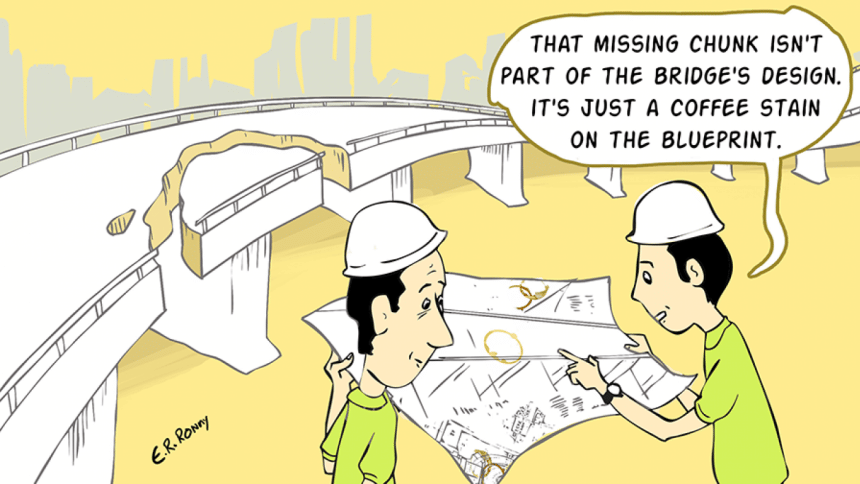Civil engineer what?

"So what's your major?"
"Civil Engineering"
"Oh. So you're like a construction worker, right?"
"No. It concerns-"
"OH WAIT, YOU'RE A FANCY ARCHITECT!"
There are some degrees out there that simply tend to be misinterpreted and misunderstood by the people around you and regardless of its existence since the dawn of civilisation itself, Civil Engineering happens to be one such field. The most common confusion that happens here in Bangladesh is probably between a plumber and a civil engineer, but architects and construction workers are right up the alley too.
So what exactly is Civil Engineering? And how is it any different from the study of architecture?
According to Wikipedia, Civil Engineering is a professional engineering discipline that deals with the design, construction, and maintenance of the physical and naturally built environment, including works like roads, bridges, canals, dams, and buildings. My father happens to be a civil engineer and when I asked him about the difference between an architect and a civil engineer, he said that architects design the building, whereas a civil engineer designs the site. If a building were to be a human body, the civil engineer would be in charge of the skeleton while the architect would deal with the aesthetic appearance. So basically, any sort of infrastructure design, development or construction would require civil engineers.
Find out: What are the top Civil Engineering careers?
So apart from buildings, do you just build bridges? Is that it?
"I mean sure try and get across your rivers without us. Let's see if making apps on Android help you there," says Muin Ahmed Alif, currently enrolled in University of British Columbia. "Students in other Engineering streams tend to think our job is easy, which it clearly isn't. I mean seriously, try designing a sewage system for Dhaka populated by 6.97 million people producing the amount of faeces everyday, which is enough to make up an island the size of Hawaii in a month."
Well, you can't blame them for being so offended, because it turns out that Civil Engineering programs diversify into a range of different specialised fields. Structural design, Geotechnical Engineering, Water Resource Management, Seismic Design and Fluid Mechanics are only a few of the many fields available. So it's safe to say that your average civil engineer is not only concerned about sewage lines and bridges.
Now that you don't think of civil engineering as a lame field anymore, what are the prospects of it in Bangladesh as well as abroad?
Needless to say, very few universities offer Civil Engineering in Bangladesh, BUET being undoubtedly the best of them. Other institutions tend to lack the technology and funding to offer its students the research and academic facilities as well as the plethora of options they can choose to focus on. In terms of employment, very few BUET graduates stay back in the country after graduation and those who do either apply for government engineering jobs or university faculties.
For a field of study that requires a lot of technological and research facilities, it is obvious that studying abroad provides greater opportunities. Apart from these, foreign programs have Co-op program placements that connect the students to the job markets before graduation, which is similar to summer internship programs. After graduation, every engineering student needs to be in an "Engineer in Training" status under a professional Engineer, in order to become a practicing Engineer and gain their P. Eng certification.
So next time you want to throw a joke at someone who's studying Civil Engineering, think again. Think civil.
The writer is a sophomore at the Institute of Business Administration, University of Dhaka
Illustration: Ehsanur Raza Ronny

 For all latest news, follow The Daily Star's Google News channel.
For all latest news, follow The Daily Star's Google News channel. 



Comments